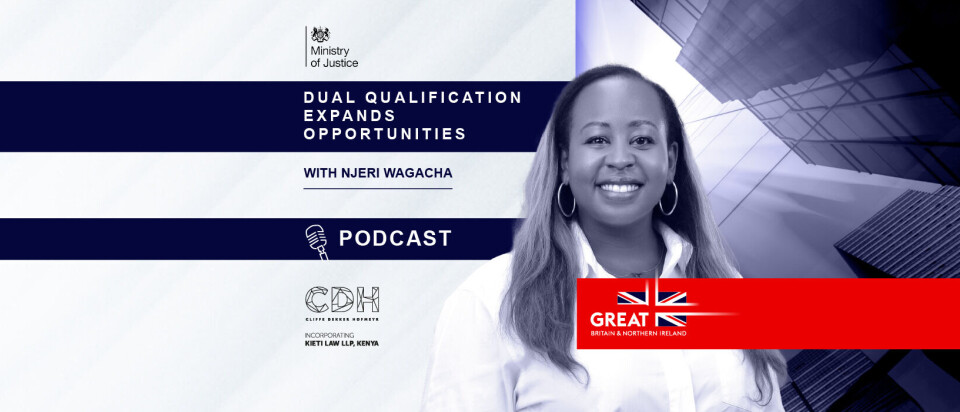Copyright : Re-publication of this article is authorised only in the following circumstances; the writer and Africa Legal are both recognised as the author and the website address www.africa-legal.com and original article link are back linked. Re-publication without both must be preauthorised by contacting editor@africa-legal.com
Dual qualification expands opportunities

Africa Legal, in partnership with the UK Ministry of Justice and GREAT Legal Services, is hosting a series of events in Johannesburg, South Africa, from 31 August to 1 September, with the theme being Law at an International Level. In this podcast, Africa Legal chats to Njeri Wagacha on the benefits of being a dual qualified African lawyer.
The road to being able to practise in more than one jurisdiction was a long and winding one for Njeri Wagacha, bilingual corporate partner at Cliffe Dekker Hofmeyr (CDH) incorporating Kieti Law LLP, but she is now reaping the benefits.
She did her first degree, an LLB, in England, qualified as a solicitor in London, fitted in an LLM somewhere in between, then returned to Kenya and got certified as an advocate.
The reward for being well versed in both the UK and Kenyan law, says Njeri, is being able to deliver on mandates which span and interact with both systems.
“Kenyan law emanates from UK law in terms of the Commonwealth jurisprudence and precedents, and so transitioning from the UK to Kenya was very easy in terms of understanding the law and its application,” she commented.
Njeri says the added value of being dual qualified is being able to offer a broader, more multidimensional service than just in Kenya. She aims to access West African clients as well.
She points out that having an English-qualified lawyer on the bench is a confidence booster for clients, “specifically in banking transactions where an English legal opinion is required, and only a UK qualified lawyer can sign off on that. In terms of mergers and acquisitions, and private equity transactions, being able to understand UK law documents or principles is a confidence booster for clients emanating out of those jurisdictions or even European jurisdictions.”
Njeri elaborated on why English law has predominantly been seen as the safer jurisdiction to enforce judgements, and wraps up the brief conversation with interesting advice for lawyers wanting to attain dual qualifications.
Listen to the podcast on: Soundcloud, Apple Podcasts or Spotify.
To join Africa Legal's mailing list please click here
